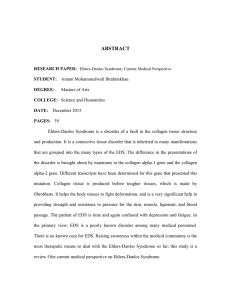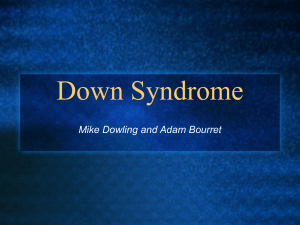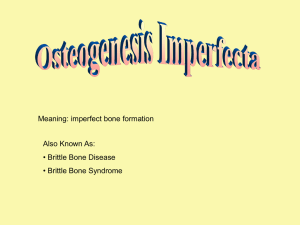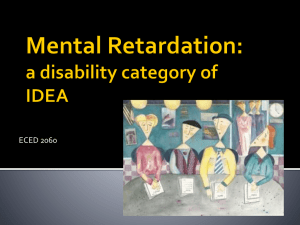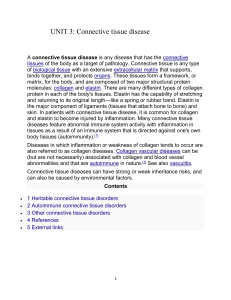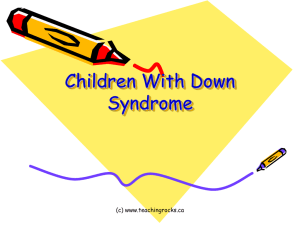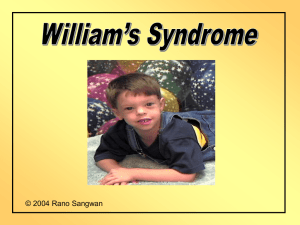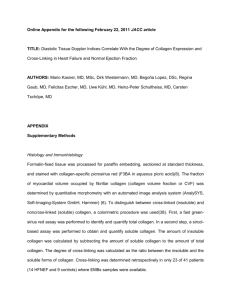dr.chandrika rao
advertisement
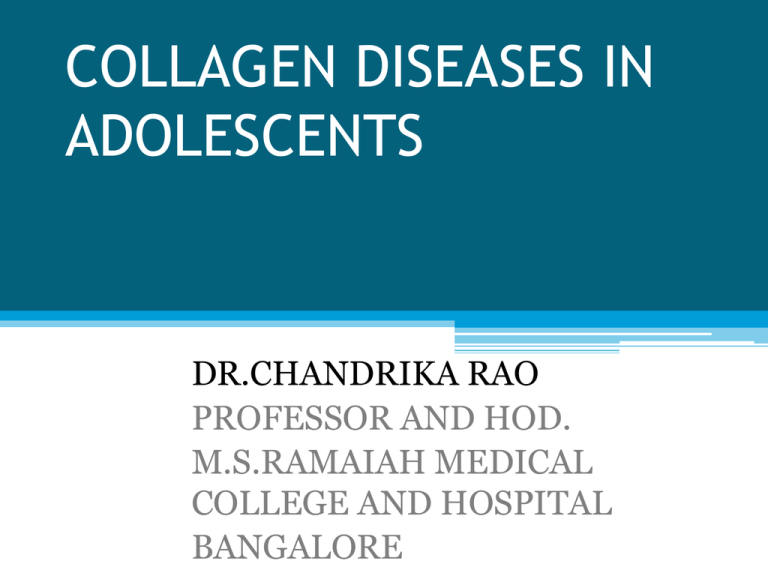
COLLAGEN DISEASES IN ADOLESCENTS DR.CHANDRIKA RAO PROFESSOR AND HOD. M.S.RAMAIAH MEDICAL COLLEGE AND HOSPITAL BANGALORE Definition • Collagen-Greek-`Glue producer` • Collagen diseases-A small group of disorders due to structural or metabolic defects in collagen. CASE 6'4", Armspan of 6'7“. He has hypermobile joints in his knees, shoulders and ankles. CASE CASE Collagen-Structure • Generic term for proteins forming a triple helix of three polypeptide chains . • All members of the collagen family form these in the extracellular matrix . • Size, function and tissue distribution vary considerably. • N=28 Type Collagen Distribution Disorders Osteogenesis imperfecta, Fibril-I,II,III,V,XI I II III IV Most abundant .Scar tissue,tendons, skin, artery walls, cornea, bones and teeth. Hyaline cartilage,. Vitreous humour . Ehlers–Danlos syndrome especially type IV, Infantile cortical hyperostosis aka Caffey's disease Collagenopathy, types II and XI Granulation tissue, Reticular fiber. Ehlers–Danlos artery walls, skin, intestines and syndrome, Dupuytren's the uterus contracture Basal lamina; eye lens, glomeruli Alport syndrome, Goodpasture's syndrome VI Most interstitial tissue, assoc. with type I Ulrich myopathy, Bethlem myopathy, Atopic dermatitis VII Forms anchoring fibrils in dermoepidermal junctions Epidermolysis bullosa dystrophica VIII Some endothelial cells IX FACIT collagen-(IX,XII,XIV,XV), cartilage, assoc. with type II and XI fibrils Posterior polymorphous corneal dystrophy EDM2 and EDM3 Hypertrophic and mineralizing X Schmid metaphyseal dysplasia cartilage Collagen vascular disorders • • • • • Discoid lupus erythematosus Systemic lupus erythematosus Neonatal lupus erythematosus Juvenile dermatomyositis Childhood scleroderma Approach • • • • • • Detailed history Progressive Multiple areas involved Skin,Musculo-skeletal involvement Family history Remmision and relapse GENETICS Different Types of Mutations in Collagen I Chain Genes Cause Different Disease Severities Gene location mutation Syndrome COL1A1 17q22 Null alleles OI type I Partial deletions; C-terminal substitutions OI type II N-terminal substitutions OI types I, III or IV Deletion of exon 6 EDS type VII Splice mutations; exon deletions OI type I C-terminal mutations OI type II, IV N-terminal substitutions OI type III Deletion of exon 6 EDS type VII COL1A2 7q22.1 Family Tree 45 AAA ? 69 28 aortic aneurysm, aneurysm of kidney 28 AA 31 AA, cerebral hemorrhage 44 45 ?valve replacement 13 aortic aneurysm 28 AA Ehlers-Danlos syndrome The signs and symptoms of Ehlers-Danlos syndrome vary from mildly loose joints to life-threatening complications • Diseases of Elastic Fiber • • • • • • Cutis laxa Williams syndrome Buschke-Ollendorff syndrome Menkes disease Pseudoxanthoma elasticum, Marfan's syndrome SLE Revised Diagnostic Criteria 1. Malar rash 2. Discoid rash 3. Photosensitivity 4. Oral ulcers 5. Arthritis 6. Serositis 7. Renal disorder 8. Haematologic disorder 9. Neurologic disoder 10. Immunologic disoder 11. ANA 4/11 are present serially or simultaneously. Preliminary Classification Criteria for Undifferentiated Connective-Tissue Disease Inclusion Criteria Exclusion Criteriaa Laboratory Criteriaa Signs and symptoms suggestive of a CTD but not fulfilling the diagnostic or classification criteria for any of the defined CTDs b for at least 3 years c Malar rash Discoid Lupus Cutaneous sclerosis Heliotrope rash Gottron papules Erosive arthritis Anti-dsDNA Anti-Smith Anti-U1-RNP Anti-Scl70 Anticentromere Anti-La/SSB Anti-Jo1 Anti-Mi2 Presence of antinuclear antibodies determined on two different occasions Investigation • • • • • CBC,ESR,CRP Urinalysis Serum creatinine Rheumatoid factor (RF) ANA-IFA X-ray CT Scan Early renal biopsy • • • • • Other: CK,C3, ,TSH,Anti-Ro/SSA,Anti-La/SSB Anti-Smith,Anti-cardiolipins, Lupus anticoagulant Vitamin D - 25(OH)D3 Treatment • Early diagnosis.HEADDSS • May still utilize tried & tested agents initially • Phenytoin, Cyclosporine,Ca Channel blocker- Nifedipine-stimulatory drugs. • Newer immunosuppressive & immunomodulatoryNASAIDS,Cox-2inhibitor, Cyclosporine, Azathioprine, Ca channel blocker. CONCLUSION • A multidisciplinary approach. • The aim should be to reduce disease activity to a minimum level and to allow treatment free intervals, so that the growth, development, and fertility of these children are ensured. •Thank you •Q:Acquired collagen disorder?
